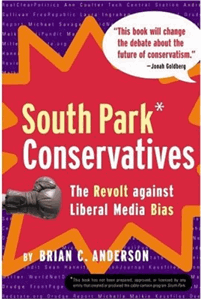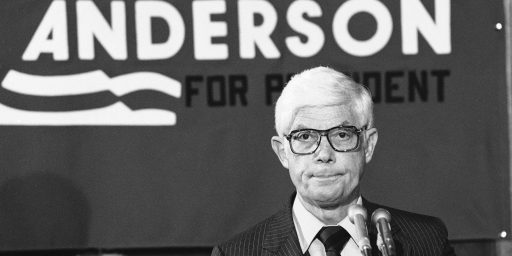Book Review: South Park Conservatives
Brian C. Anderson, South Park Conservatives: The Revolt Against Liberal Media Bias (Washington, Regnery) 2005, xv, 191, Notes, Index, $24.95 hardcover.
 I accepted Regnery Publishing’s offer to review City Journal editor Brian Anderson’s brand new book South Park Conservatives with great anticipation. The titular concept, popularized (as “South Park Republicans“) by Andrew Sullivan and Stephen Stanton, is a fascinating one: the rise of a large irreverant, anti-religious, anti-authoritarian, libertarian faction within the stodgy Grand Old Party. As described by Sullivan, SPRs are people who “believe we need a hard-ass foreign policy and are extremely skeptical of political correctness (99).” The concept is perhaps best epitomized by show co-creator Matt Stone’s statement that, “I hate conservatives, but I really $%^$@#! hate liberals (75-76).”
I accepted Regnery Publishing’s offer to review City Journal editor Brian Anderson’s brand new book South Park Conservatives with great anticipation. The titular concept, popularized (as “South Park Republicans“) by Andrew Sullivan and Stephen Stanton, is a fascinating one: the rise of a large irreverant, anti-religious, anti-authoritarian, libertarian faction within the stodgy Grand Old Party. As described by Sullivan, SPRs are people who “believe we need a hard-ass foreign policy and are extremely skeptical of political correctness (99).” The concept is perhaps best epitomized by show co-creator Matt Stone’s statement that, “I hate conservatives, but I really $%^$@#! hate liberals (75-76).”
Sadly, however, the title is mostly a marketing gimmick. Instead, the book focuses almost entirely on the subtitle: the rise of a conservative alternative to the liberal mainstream media. Anderson does a solid job covering this subject, although it’s one that’s rather well trod by this point by denizens of the blogosphere.
Introduction
Anderson argues that the blogosphere-led move of CBS’ “The Reagans” movie to Showtime in late 2003 and, especially, RatherGate prove that the liberal domination of the news media is over. He also argues that the Swift Boat Veterans would have been unable to have a significant impact on the 2004 election absent this change.
1. The Old Media Regime
Anderson gives several examples of the overwhelming liberal bias of the mainstream media, citing authoritative studies. Further, he argues that the culture of “objectivity” was such that, during the Cold War, Western journalists “frequently gave the propaganda of the Soviet Union and its satellites equal footing with American officials’ statements.”
2. Illiberal Liberalism
Anderson argues that, despite their self-professed love of “tolerance,” many liberals automatically label the views of their opponents as “racist,” “homophobe,” “sexist,” “mean-spirited,” or “insensitive (17).” He notes that the definition of “racism” has expanded so far that, to quote Dinesh D’Souza, it “must be inferred (21).” Because liberals have historically dominated the elites who govern what is politically correct, the views of the vast majority of Americans on issues such as abortion, affirmative action, and school prayer are dubbed “extremist.”
I would note, though, that some of these issues are ones where South Park Republicans agree with the liberal elite. And it goes without saying that conservatives have done a good job of playing catch-up on the use of ad hominem labeling to delegitimate the views of their opponents.
3. Fighting Back: Conservative Talk Radio
Anderson provides an excellent, concise history of the rise of Rush Limbaugh and his legion of successors which he traces to the repeal of the so-called Fairness Doctrine during the Reagan Administration. With stations no longer required to give equal time, for free, to rebut any political statement made on their air, controversial and entertaining opinionmongering took off. He provides several interesting insights in this chapter, including a discussion of some of the business aspects of talk radio, such as the “barter model” which eliminated the risk to station owners of giving syndicated shows a try (37) and the commerical success of products like Snapple which got on the bandwagon early. The contrasting styles and ideologies of Limbaugh, Sean Hannity, “Dr. Laura” Schlessinger, G. Gordon Liddy, Michael Savage, and numerous others are laid out for the reader.
Again, though, these hosts are all more-or-less standard religious conservatives, ranging from the moderate right to the far right. None of the hosts profiled or cultural arguments given for why they have been wildly successful have much to do with South Park Republicanism. Indeed, the hosts profiled here to whom I’ve listened are quite critical of the vulgarity of modern pop culture. I can’t imagine Limbaugh, Liddy, Hannity, or Savage chuckling along with Kyle, Kenny and the gang.
4. The FOX Effect
An solid examination of the rise of Fox News and why it has been so important. Interestingly, Anderson also discusses the rise of C-SPAN, founded by “Brian Lamb–a former Department of Defense public relations man, Richard Nixon campaign aide, journalist, Hill Staffer….” The recounting of how Newt Gingrich used the network to climb to power is well trod but the insights into how simply pointing a camera at things like Heritage Foundation panel discussions and the ability of conservative authors to promote their works on “Booknotes” in a non-hostile environment is quite thought provoking. Again, though, not a lot of SPR connection.
5. South Park Anti-Liberals
Finally, on page 75, we get to the titular subject. Anderson does an excellent job of illustrating the anti-liberal, anti-PC nature of Comedy Central’s hugely popular vehicle–now in its eighth season. Notably, the show harshly lampoons such Leftist shibboleths as affirmative action, radical environmentalism, hypertolerance for bizarre behavior, and belief in the inherent superiority of the natural to the modern. He recounts at length an exchange with the boys and a fictitious representative of the North American Man-Boy Love Association, which, while quite amusing, sheds little light on the topic at hand. While there are certainly those on the Far Left who push tolerance to such an extreme, I know of no mainstream Democrat who supports pedophilia.
The chapter shows how effective derisive humor can be at illustrating the absurdity of a political view. (This is a theme that runs throughout the book, perhaps the only sense in which Limbaugh is an SPC.) Moving beyond “South Park,” Anderson points to several stand-up comedians, notably Colin Quinn and Dennis Miller, who qualify as SPCs.
6. The Blogosphere
Anderson discusses the power of blogs and Internet media such as Drudge, RealClearPolitics, Chris Muir’s “Day by Day” cartoon, and others have had on the American political climate. This topic is well known to anyone who has read these media for any length of time, as there’s nothing bloggers like discussing more than how important blogging is. Anderson’s summary is an excellent primer, though, with minor quibbles. Most notably, his statement “the blogosphere currently leans right (101)” is highly debateable at this juncture, although it was certainly true two or three years ago.
Interestingly, though, Anderson doesn’t connect the SPC theme with this chapter particularly well. Of all the media discussed in the book, the right-of-center blogosphere is the most dominated by SPCs. Indeed, libertarian secular humanists dominate the Right blogosphere like no other venue, far out of proportion of their influence within the Republican Party or, indeed, American politics generally.
7. The Conservative Book Publishing Revolution
A solid recounting of the rise to prominence of conservative books in the last fifteen years or so. I would note, though, that most of those mentioned are an outgrowth of talk radio and FOX News. In that sense, they’re celebrity books (and, frankly, usually hastily-crafted, ghost written talking points rather than true intellectual works).
8. Campus Conservatives Rising
A look at the rise of College Republicans and other conservative voices, with young conservatives battling their ’60’s hangover professors. There’s a bit of the SPC theme here, with nods to the fact that many of these students are more tolerant on homosexuality and other social-sexual mores than mainstream Republicans. The extent to which that’s a function of a new ideology vice the natural tendency for the young to be skeptical of rules–especially those which keep them from getting laid and drunk–is unclear, however. Still, most of the students profiled are very much traditional Republicans, inveighing against the sexual and alcoholic promiscuity of their peers.
Conclusion
Conservatives haven’t won this fight yet, but they appear to be winning. A missed chance to say, “Conservatives, F– Yeah.”
Bottom Line: I’d have enjoyed the book more had it come with a different title–say, The Rise of Conservative Media–that created different expectations. The book was fine for what it was but not what it purported to be.
Anderson cites Michael Novak’s statement that, “People expect to be moved by books, to learn, to be changed (125).” While I learned quite a bit from this book, I was not especially moved or changed.
For a contrarian review, see Ed Driscoll‘s take in today’s Tech Central Station.
Related:
- John Hawkins, The Best Quotes From South Park – Right Wing News
- Stephen W. Stanton, “South Park Republicans” Tech Central Station, October 2002.
- Answers.com, “South Park Republican.”
Disclaimer: I have received no compensation from the author or publisher for this review, save for a complimentary copy of the book. The BlogAd advertising this book running in my left sidebar was run independently and without compensation as part of a campaign to promote sales of ads on that strip.






Rathergate was the result of Talk Radio. Talk Radio gave the Swift Vets a voice to tell the world what a coward JFK was. The MSM/DNC needed a diversion to get off the topic of his running out on his crew after only 0.3 of a tour. So the DNC/MSM came up withthe smear called “Favored Son”. Rathergate was Viacom’s part of the smear. The blogs proved Rathergate was a pack of lies in less than a day. But Rather has not been fired so the blogs did not have a significant amount of power.
Interesting stuff. I’m fascinated to find out about Brian Lamb’s background. As a Brit I’ve watched Booknotes on the internet and the man’s a superb host. At no point have I ever been able to get the slightest hint of what his personal politics might be, liberal or conservative. Class act in my view.